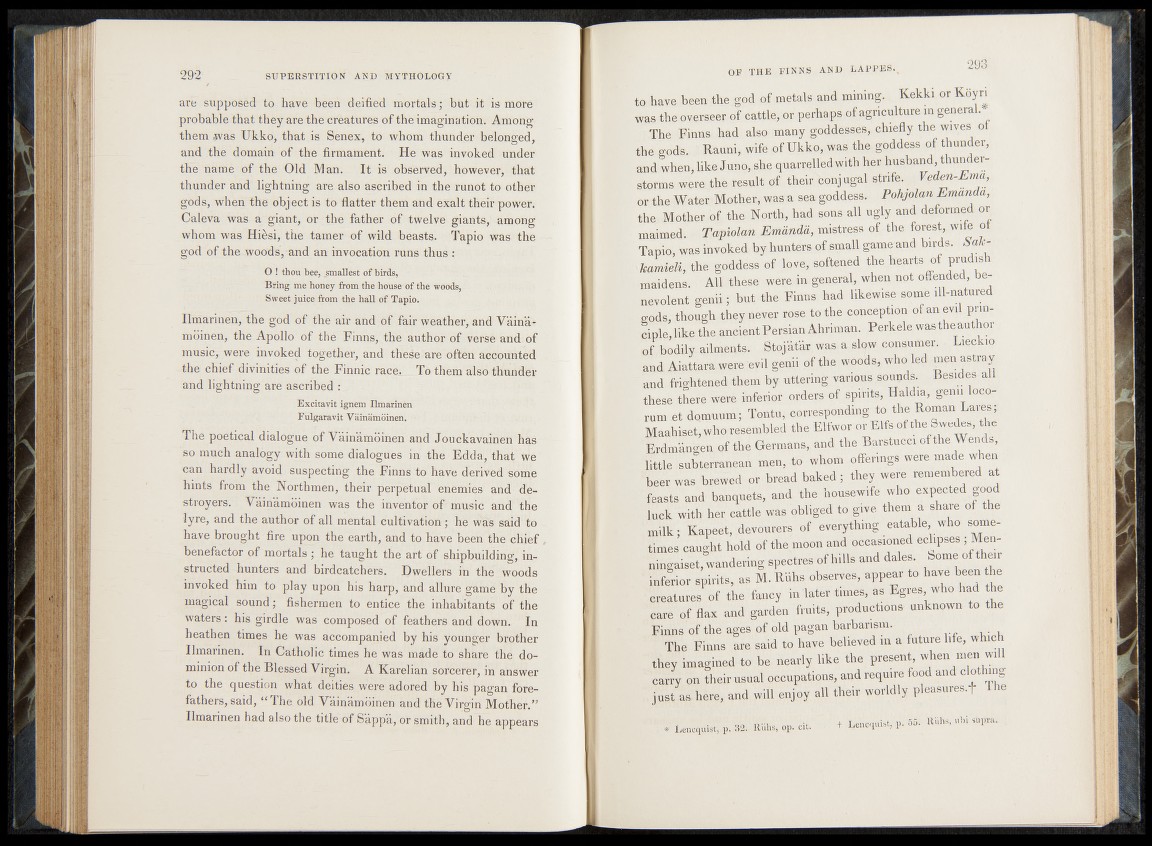
are supposed to have been deifièW.'toWrÉÉlli^but it is more
probable that they are the creatures of the imagination*- Afitong
them #vas Ukko, th a tjs Senelx, to whom thuncfer^bëlongëd,
and the dèhSaiïv of the' firmament. He was invoked' upder
fïïe’name of the Old Man. I t is observed, however, that
thunder and' lightning are also a s c r ib e d - th e runot to Other
gods, when the object is to flatter them and exalt their power.
Caleva was a giant, or the father of twelve giants,1 among
whom was Hièsi, the tamer of wild beasts. Tapio Was* the
god of thewoods,~and an invocation runs th u s :
O ! thou bee, .smallest of birils,
Bring me honey from the house of the woods,
Sweet juice, from the haU of Tapio.
Ilmarinen, the god b f the air and of fair weather, and Vainer
rnoinen, the Apollo 'óf the Finns, .the authof óf ^éfsé brïdof
music^were invoked together, and thëèe^are often accounted
-th# chief divinities óf the Finnic race; To tHem^lsd tbundfer
and lightning, are ascribed |
Excitavit ignem Ilmarinen
Fulgaravit Vaïnamöinen. -
Thé poetical dialc^no of VainSmöinen and JouckWa^ifen lias
so much analogy with some dialogues in tlie E d d ^ ’t h ^ We'
can hardly avoid suspecting the Finns to have (femed so ^ e
hints from the Northmen, their perpetual enemies' and destroyers.
Vainamoinen was the inventor o f b&sic an d 'th e
lyre, and the author of all mental cultivation 5 he wa's said‘ to
fire uR2n the earth, and to,have been the dliief
benefactor of mortals; he taught the art of shipbuilding^ instructed
hunters and birdcatchers. Jewellers in th<f woods
invoked him to play upon his harp, and allure game by the
magical sound; fishermen to entice the inhabitants of the
waters: his girdle was composed of feathers and down. In
heathen times he was accompanied by his younger brother
Ilmarinen. In Catholic times he was made to sharè thé dominion
of the Biessed Virgin. A Karelian sorcerer, in answer
to thé question what deities were adored by his pagan forefathers,
said, “ The. old Vainamoinen and fKè Virgiii Mother.”
Ilmarinen had also the title of Sapp'd, or smith, and he appears
to-ihava-bjtea.the * ^ .p f s 4 t a \ s and mini«®, Kekki or K oyn
was tl,e‘.P*r«!eM'f e a t t l ^ p e ^ a p f .o f agriculture in general.
1 .The Finns h a d , a%;lmany go^^essgs, chiefly fhe wives of
t h n i l f e Rauni, wifeflf U ^ o , was the,g<^d<»s of thunder,
and w h su ^ k n qnW # e d » ith hen h u s h e d thundetr;
■ .^ to s.» ^ th < ^ a l(i.? e ',th e iR ^ }H g a h s tr ife^ F e ife « -£ » n a ,
or .the Water M o% W P S » -?R#goddsp8i Pohjolan Emanda,
thq.,M0l i 6s .d f..t)rt|o rth , h ^ ,9 9 ^ 1 } ( .u * l and-dqformed or
maimed-- T,dpiolm-.Emandd,misgjjgsof.tlie forest,.wife of,
Tapio, was invo&d,hy huntSF^of,small game and birds. Sak-
L-hntMi, the goddess •oS&voj^ftened hearts, of prudish
I .rtaiflefl».! All |teNif«reiSn>general, w h ^ o t ottended, be-
n»v6l8nt genii.; but fte.Fin»Mhad Ukewjse^me ill-patured
- d f'anevl1 P " n -
c ip lL lito h e ^ n c ^ itP e rs ia n Ahrimao. PerkeJe,was.theauthor
n f Bodily aihnpUs.- slcjw p u n i e r . I Lieckio
and Aiatterl6*We;efil g e # J # < = . woods, who l a ^ p W ,
“ and fngKtdneds.them by uttering various sounds. ..Residefall
Ethcse.theteS&A-inferior qrdete of. Spirits, Haldia, genu-
K um .e t dWuatdy Tontu, 8ai|r^ponding^o the Roman Lares;
Erdmangen of the Carmans, and the BarstuiKnof the Wends,
U m snbteSndad men, to w hom.otomgs w®*made when
l i e rw i t s breWd or bread baked; they were remembered at
H and wHm mthe I B m who m with her cattle was obliged to give them a share of the
W M Kapeet, .devou^ers". of everything eatable, who sometimes
caught hold of the moon and occasioned eclipses, Men-
ningaiset, wandering spectres of hills and dales, borne of their
‘ inferior spirits, a s M. Riihs .observes, appear to have been the
‘ creatures p f th e fancy in la te r times, as Egres, who had the
care of. flax and garden frnits,productions- unknown, to the
Finns of the ages of old pagan barbarism. g .
The Finns are said to have* believed m a future life, which
. th^y im a g in e d ^ be nearly like the present whem men wxll
carry on their usual occupations, and require 00 an c o mg
"fjus.t-as.here, and will enjoy all their worldly pleasures.-f* T e
Lencquist, p. 32. Riihs, Op. I^encquist, p. Riihs, uhi süpïa.